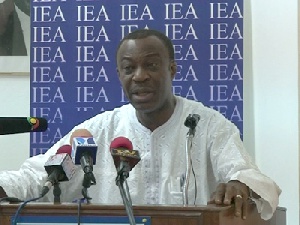 Dr Anthony Akoto Osei, MP for Old Tafo and Ranking Member on Finance
Dr Anthony Akoto Osei, MP for Old Tafo and Ranking Member on Finance
The Member of Parliament for Old Tafo and ranking member on Finance, Dr. Anthony Akoto Osei, has stated that the country risks losing its foreign investors, especially holders of the country’s bonds, if instability in the economy continues.
“These days, foreigners are majority-holders of our Eurobond; when you get this fluctuation in the economy they begin to move out. When they go, they create problems for you.”
The country, he said, could lose asset manager Templeton, which remains the largest single investor in Ghanaian bonds.
“In fact my worry is that if we don’t stabilise the economy a company like Templeton will move out; and that brings panic, so it’s not good for us,” he said.
“When they see your economy is not stable they will not come, an investor wants peace of mind; they want good returns but peace of mind. If they feel it is dicey they are not comfortable, they will go elsewhere; especially when we are going into an election year. So they would rather move out now than wait, and when they start doing that the pressure gets to us; the repatriation will be in foreign currency. If you want them to be happy and keep them here, we have to do something about it,” Akoto Osei added.
Templeton added to their holdings of Ghanaian bonds in 2013, despite a budget deficit at 10% of GDP, a weakening currency and a warning from the IMF that the country’s borrowing was unsustainable. The investment lost value until August of 2014, when the IMF announced that Ghana had requested a bail-out and prices jumped.
The minority spokesperson on finance also maintained that the country could have done without the IMF programme, which involved a three-year US$918million financial assistance deal for Ghana aimed at restoring economic stability and boosting job growth.
An IMF programme is seen as a key to assuring investors on the economy. It should yield budget support from donors, but more importantly make it easier for the country to gain access to domestic and international debt markets.
Dr. Akoto Osei however disagrees, saying: “You don’t need an IMF programme to discipline yourself, do you? If you are spending more than you have, you should check yourself and limit it to your means: in 2012, a deficit of 12 percent; a deficit of 11 percent in 2013; and 2014, a deficit of 10 percent. It is not normal, so that discipline should be self-imposed; if you don’t do that and you call for their help they will come in to help. But the money is not free, it comes with conditionalities. So, do we want to live our lives with somebody dictating to us all the time?”
Already, Government has exceeded its borrowing target for the first six months of this year by more than GH¢763million, further deepening concerns about the country’s debt position.
Figures available to the B&FT from the central bank indicate that government borrowed a little above GH¢26.18billion in the first half of this year, which is more than the GH¢25.42billion it had planned to borrow from the domestic securities market.
The borrowings of government do not include the debts incurred by the Bank of Ghana and Cocobod, which together also borrowed GH¢3.9billion within the period.
Although the cedi began July strongly on the back of the central bank’s increased dollar sales, the past fortnight has seen the cedi relapse to its woeful performance that characterised the first half of this year.
Government will be raising an amount of 1.5 billion dollars from the European Bond Market to manage Ghana’s liabilities and to support the 2015 budget in September.
One billion dollars out of the facility will be utilised for financing the 2015 budget to reduce the reliance on expensive short-term domestic debts, and the remaining 500 million dollars will go into refinancing domestic and external debts.